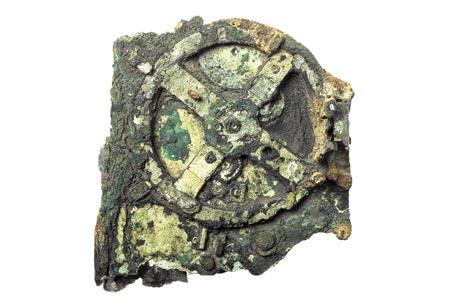There has never been a time in history when it is easier to discover, use, or learn about Astrology. With a press of a button or a software program, you can calculate your birth chart and receive a computer analysis of what the planetary positions and signs mean. But why is it good to know?
In ancient times wise men observed the stars and orbits of the planets, measured the distances between constellations, and noted the eclipses. They used astrolabes to measure the heavens and a very interesting device called the Antikythera, (image below) that could, calculate the positions of the Sun and Moon, solar and zodiac calendars as well as eclipses. Originally plotting the heavens was an aid to navigation as well as creating a calendar. Then with more observation the ancient astrologers began to correlate phenomena in the heavens with activities and events on earth. Astrology became the province of emperors and kings and was used to rule their people, warn of revolt, famine and invasions.
Jumping to the 20th century Medicine, Science, and Technology developed very sophisticated statistical models and experiments to explain phenomena. Astrology waned and went the way of old fashioned superstition. Sun sign columns in the newspaper became entertainment and "what's your sign," a great pick up line.
Now in the 21st century, the Age of Aquarius, we are embarking on new ways to accumulate and interpret knowledge. I predict that astrology will have a legitimate and significant part in the New Age and be a positive factor in medicine, personal relationships, energy sources, and what I loosely call spiritual evolution. But Astrology's contribution will not offer statistical analysis, or controlled experiments. Why not? Because astrological information resonates in a different way from scientific studies.
Astrology is a system of how the motion of the heavens manifests itself on earth. We do not have a clear physical, tangible explanation for why, just that it can work. Some thinkers have called astrology a system of synchronicity; tribal people who read meaning in the connection between disparate events, call these coincidences and relationships, the hand of god. Such ideas tend toward a magic or mystical view of life. But if we encounter Astrology with an open mind and consider the perspective the study offers we may very well enlarge the "data base" and find new uses for this ancient practice.
It is good to be clear about what Astrology can and cannot do. People who ask me for an exact prediction may be disappointed. Usually this question is connected to how much money will I get or how successful will a project be. I say there is no planet that reveals a dollar amount or whether your efforts will "go viral" on the web.
What astrology can do is tell you is if this is the time to go forward, to wait, or to give up the project. Astrology is also the best personality revealer. The face we wear to the outside world can be very different from our inner life and in matters of love, marriage, and business partnerships knowing the inclinations of a future partner can be very valuable information. In ancient times all doctors followed the rhythm of the planets in administering cures and treatments. In my last post I mentioned how useful Astrology can be in planning travel.
SO: Astrology is not superstition, not science, but something else. And the something else is a beautiful tapestry of image, history, and wisdom. Let's see how it evolves in the coming decades. We may be surprised.

